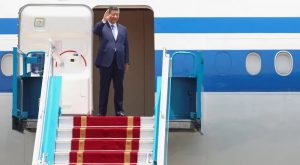National security agencies in China have raided offices of another major consultancy as part of its anti-espionage crackdown on firms doing due diligence work for foreign companies.
Police questioned employees during raids in recent months on multiple offices of Capvision, a top international advisory firm – in Shanghai, Suzhou, Beijing, Shenzhen and other cities – amid concern that such companies are being used to obtain sensitive data.
State broadcaster China Central Television said “profit-oriented consulting firms sometimes have a weak awareness of the country’s national security concerns, and had frequently operated at the edge of legality to gather information in sensitive sectors of the military, the defence industry, the economy and finance,” according to the Wall Street Journal.
CCTV said some consultants in China had harmed national security and effectively helped the West in “spying, buying and extorting state secrets and intelligence,” it said.
ALSO SEE: China’s Security Focus Undermining Its Economic Goals
The news follows raids on US consultancy Bain & Company’s office in Shanghai late last month, and US due diligence firm Mintz Group in March, which led to its Beijing office being shut down and five local staff being detained.
China also expanded its anti-espionage law on information sharing last month.
But the campaign to restrict overseas access to Chinese data sources was partly triggered by US think tank reports on sensitive Chinese practices that alarmed Beijing, the Wall Street Journal reported on Monday.
In recent years, China has detained dozens of Chinese and foreign nationals on suspicion of espionage, such as an executive at Japanese drugmaker Astellas Pharma who was detained in Beijing in March. Espionage cases are usually tried in secret due to their links to national security.
Raids erode foreign business confidence
Overseas business lobbies in China said on Tuesday they were unnerved by the sweeping crackdown on consultancy and due diligence firms that is damaging investor confidence in the world’s second-largest economy.
The EU’s ambassador to China also raised concern about what state media described as “intensifying” law enforcement aimed at protecting national security, and a broadening of legislation that criminalises the transfer of information and data.
The crackdowns “send a worrying signal and heighten the uncertainty felt by foreign companies operating in China”, the EU’s Chamber of Commerce in China said in a statement.
“The developments are not conducive to restoring business confidence and attracting foreign investment.”
Eric Zheng, president of the American Chamber of Commerce in Shanghai, also expressed worries about the crackdown, while calling on authorities to “more clearly delineate” which areas of due diligence were permissible.
“Without proper due diligence, foreign companies will be unable to invest in new projects in China,” he said.
Companies ‘brought under control’
Foreign Ministry spokesman Wang Wenbin said authorities had “brought under control” the relevant companies, while aiming to “promote and standardise the healthy development of the relevant (consulting) industry”. China says it welcomes foreign investment as long as firms abide by its laws.
The scrutiny of consultancies including Capvision Partners, which state media says is aimed at stopping the theft of state secrets including defence and technology, is the latest step in a years-long campaign to tighten control of information.
“This … is part of a broader trend in China’s tightening grip on sensitive information, particularly in light of the ongoing tension between China and the United States,” said Ani Chaudhuri, CEO at data security platform Dasera.
“The crackdown on consulting firms may be interpreted as a warning to foreign companies operating in China, highlighting the need for businesses to reassess their data handling practices and security measures.”
CCTV report on Capvision
On Monday evening, state broadcaster CCTV aired a 15-minute report on Capvision, saying it had accepted projects from overseas companies to source information, including “state secrets and intelligence” on sensitive sectors including defence and advanced technology.
“Some of these enterprises have close relations with foreign governments, military and intelligence agencies,” CCTV said.
From 2017 to 2020, Capvision accepted more than 2,000 remittances amounting to $70 million from hundreds of overseas companies, CCTV added as it carried footage of Capvision’s offices and interviews with state security agents.
An expert hired by the firm was jailed for six years for “stealing, espionage and providing state secret intelligence abroad”, CCTV said.
Capvision, reportedly set up in 2008 by ex-Bain consultants and Morgan Stanley bankers, said in a statement soon after the broadcast that it would resolutely abide by national security rules. Staff declined to comment on Tuesday.
The CCTV report was the first clear indication of the national security scope of recent police action against several consulting firms.
Jiangsu Television, another state broadcaster, alleged on Monday that Capvision had failed to “seriously fulfill its counter-intelligence responsibilities and obligations to prevent espionage”, according to the BBC.
The broadcaster accused firms such as Capvision of routinely hiring “highly-paid consulting experts” with close ties to Chinese authorities to “illegally obtain various types of sensitive data”, which an unnamed police officer said posed “major risks to China’s national security”, the report said.
- Jim Pollard with Reuters
ALSO SEE:
China’s Anti-Espionage Law Adds to Foreign Business Concerns
Micron Probe Fuels Fears of US Businesses in China
China Raids Office of US Due Diligence Firm, Detains Staff
US Has No Plan to ‘Decouple’ with China, Yellen Says
























